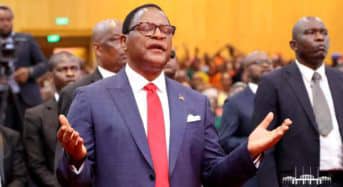The Church economics is not helping Malawi—and will not help anyone in the end
By Burnett Munthali
Once upon a time, there was a growing belief among many in Malawi that the church could solve economic problems. People began to turn more and more to religious leaders for answers, hoping that divine intervention or church-led economic models might rescue the nation from its hardships. It was as if the pulpit could replace policy, and prayers could substitute for practical solutions. But what started as a glimmer of hope soon turned into disillusionment.
Let me take you back to a small village where a devoted congregation gathered every Sunday. The preacher would speak of prosperity, claiming that faith alone could move mountains of economic woes. He urged his flock to give generously, promising that their contributions would come back to them tenfold. Week after week, they opened their hearts and wallets, believing that their faith would lead to better days. But instead of prosperity, the congregation found themselves even more burdened.
The harsh reality began to set in. The more they gave, the less they had. Church economics—this idea that spiritual offerings could replace sound financial planning—was simply not delivering on its promises. While the church grew wealthier, the people grew poorer.
But why doesn’t church economics work, especially for a country like Malawi?
Misplaced focus on miracles over mechanics
Church economics often focuses on divine intervention rather than the practical mechanics of an economy. Malawi, like any other nation, needs real-world solutions: job creation, infrastructure development, sound monetary policy, and investment in education. Faith can inspire hope, but hope alone cannot grow crops, build roads, or create industries. Yet, many continue to believe that the church will somehow unlock these doors.
The problem with dependency
Relying on religious leaders to lead economic change creates a cycle of dependency. When people begin to depend on the church for everything from moral guidance to financial solutions, they stop engaging with the real challenges of their environment. Economic recovery requires active citizens—people who invest in their own skills, understand market dynamics, and participate in development initiatives. If the congregation is simply waiting for blessings from above, who will plant the seeds of change?
Churches and accountability
Churches are not held to the same levels of accountability as governments or businesses. They operate outside of the economic checks and balances that ensure institutions are working in the public interest. Donations are not the same as taxes, and the financial plans of religious institutions are often focused on the church’s growth, not the nation’s welfare. Who checks how the money given in good faith is used? And how does it translate into real economic impact?
The way forward
It is time for Malawi to wake up from the dream of church economics and face the reality that genuine, sustainable growth comes from practical solutions. This does not mean that faith has no place in society. Indeed, faith can inspire individuals and communities to work together, to persevere, and to hold onto hope. But faith, without action, is hollow.
Malawi must focus on strengthening its institutions, encouraging innovation, and fostering entrepreneurship. Investments should be made in agriculture, manufacturing, and technology, areas that can create jobs and improve living standards. The church can play a supportive role in this by providing moral guidance and fostering community spirit, but it cannot replace the necessary work that needs to be done.
The story of the small village is not unique. Across Malawi, people are slowly coming to realize that the answers to their problems will not be found at the altar alone. The church may lift their spirits, but it is policy, planning, and participation that will lift the nation.
In the end, relying on church economics will not help Malawi—or anyone. Real change requires real solutions. The future of Malawi lies not in the hands of the church, but in the collective efforts of its people and leaders to build a stronger, more resilient economy.




